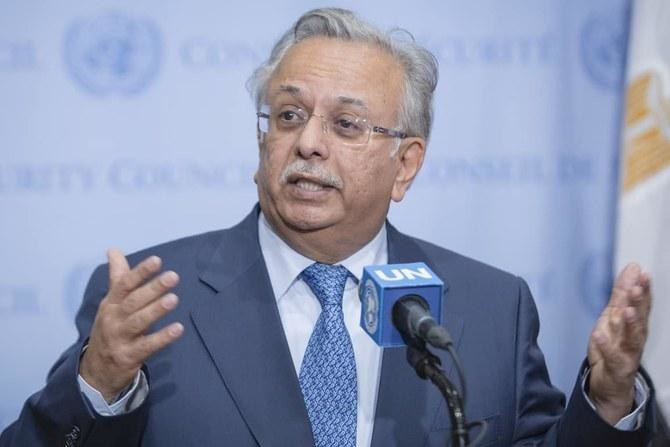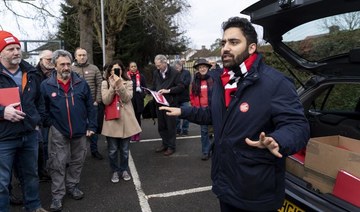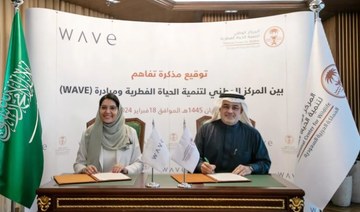NEW YORK: “Islamophobia is unfortunately pervasive everywhere,” Abdallah Al-Mouallimi, Saudi Arabia’s permanent representative to the UN, told a high-level international meeting on Wednesday.
It was organized by the Organization of Islamic Cooperation (OIC) to mark the first International Day to Combat Islamophobia. In response to an increase in attacks and other hate crimes targeting Muslims worldwide, the organization adopted a resolution in November last year calling for March 15 to be observed as a day to highlight and address the issue.
Fifty-seven countries, with a total population of 1.8 billion people, are members of the OIC. They include some, in West Africa and South America in particular, that are not Muslim-majority nations.
“Social media, hate speech and disinformation campaigns have made Islamophobia harder to address and eradicate,” said Al-Mouallimi, who stressed that any threat to the freedoms of one community based on the faith of its members is a threat to the religious freedoms of all.
Not only does the media perpetuate Muslim stereotypes through a “disproportionate” focus on the actions of individuals “perceived to be Muslims,” he said, it also plays an active role in spreading hatred. He called on the international community to come together to address this threat.
Speaking on behalf of Prince Faisal bin Farhan, the Kingdom’s foreign minister, Al-Mouallimi cited the words of the “Charter of Makkah,” which affirms that “religions and philosophies are exonerated from the sins committed by their adherents and claimants,” and that “true understanding of Islam requires an objective view that is devoid of stereotypical and prejudicial notions.”
The charter, adopted in the Holy City by the Muslim World League in May 2019, is a pan-Islamic set of principles that aim to counter extremism, advocate religious and cultural diversity, and support legislation against hate and violence. It was presented by Saudi Arabia’s King Salman, approved by the Islamic leaders of 139 countries, and signed by more than 1,200 prominent Muslims.
Al-Mouallimi also raised concerns about an increase in individual attacks against Muslims, and reminded those at the meeting that “personal behaviors should not be attributed to any religion or nationality. We underscore that the dissemination of hate speech jeopardizes the peace of society and serves the agenda of individual extremists to nourish their notion of hatred.”
The Saudi envoy called for an end to all “disproportionate measures” that target Muslims, and activities that stir up “religious intolerance, discrimination and violence.”
He reiterated the principles enshrined in the establishment of the International Day to Combat Islamophobia: a recognition of the growing threat from rising intolerance and sectarian violence; the importance of breaking perceived links that connect terrorism with any particular religion; and the need to raise awareness of acts of violence based on religion and condemn them.
Al-Mouallimi also welcomed a recent report by the UN Human Rights Council that concluded “suspicion, discrimination, and outright hatred” toward Muslims has risen to “epidemic proportions.”
It highlighted the disproportionate restrictions placed on Muslims manifesting or practicing their faith, limits on their access to citizenship, the socioeconomic exclusions they face, and the pervasive stigmatization of Muslim communities. These forms of discrimination, in the private and public spheres, “often make it difficult for a Muslim to be a Muslim,” the UN’s special rapporteur said in the report.
Muslims are frequently targeted based on visible characteristics of their faith, according to the report, such as their names, skin color and religious attire, including headscarves. The study also highlighted “the triple levels of discrimination” that Muslim women face because of their “gender, ethnicity and faith.”
The report — titled Countering Islamophobia/Anti-Muslim Hatred to Eliminate Discrimination and Intolerance Based on Religion or Belief — also examines “how Islamophobia perpetuates a vicious circle whereby state policy validates private Islamophobic attitudes and actions, and the prevalence of such attitudes can propel state policies that penalize Muslims; with stark consequences for the enjoyment of human rights, including freedom of religion or belief.”
It concludes that “cumulatively, in some contexts, such actions may amount to the level of coercion as prohibited under international law.”
UN Secretary-General Antonio Guterres told the meeting: “Unfortunately, far too often stereotypes are further compounded by elements of the media and some in positions of power.
“Anti-Muslim bigotry is sadly in line with other distressing trends we are seeing globally: a resurgence in ethno-nationalism, neo-Nazism, stigma and hate speech targeting vulnerable populations including Muslims, Jews, some minority Christian communities, as well as others.”
Although acts of intolerance might not always be recorded in official statistics, they “degrade people’s dignity and our common humanity,” Guterres said.
“Discrimination diminishes us all,” he added. “As the Holy Qur’an reminds us: nations and tribes were created to know one another.”
Calling for social cohesion and an end to bigotry, the UN chief said that fighting discrimination, racism and xenophobia is a priority for the organization.
Other guests at the meeting included President of the UN General Assembly Volkan Bozkir, OIC Secretary-General Yousef Al-Othaimeen, UN High Representative for the Alliance of Civilizations Miguel Angel Moratinos, and the foreign ministers of Iran, Turkey and Pakistan.
Saudi Arabia calls for greater tolerance as crimes against Muslims soar
https://arab.news/89vjn
Saudi Arabia calls for greater tolerance as crimes against Muslims soar

- ‘Social media, hate speech and disinformation’ are making it harder to tackle Islamophobia, envoy tells high-level meeting
- UN report found anti-Muslim hate has reached “epidemic proportions;” trend is fueled by media and some leaders, says Guterres
Saudi crown prince meets White House national security adviser Sullivan

- Crown Prince Mohammed bin Salman received the US official in Dhahran
- SPA said their discussions included Saudi-US strategic relations, the Gaza War, and Palestinian statehood
DHAHRAN: Saudi Crown Prince Mohammed bin Salman met with White House national security adviser Jake Sullivan in eastern city of Dhahran, the Saudi Press Agency reported on Sunday.
During the meeting, the strategic relations between the two countries and ways to enhance them in various fields were reviewed, SPA said.
It said efforts to find a credible solution to the Palestinian issue, including a lasting ceasefire and unhindered entry of humanitarian aid in Gaza, with a view to a “two-state solution that meets the aspirations and legitimate rights of the Palestinian people”, were also discussed.
Greece’s prime minister receives MWL chief in Athens

RIYADH: Greek Prime Minister Kyriakos Mitsotakis received the secretary-general of the Muslim World League on Tuesday in Athens, the Saudi Press Agency reported.
During the meeting, Mitsotakis and Mohammed Al-Issa discussed a number of topics of common interest.
Al-Issa, who is also chairman of the Association of Muslim Scholars spoke about Islamic values that call for global peace and understanding between its peoples, and said he appreciated the warm reception he received during his visit and the good sentiments expressed toward the Islamic civilizational contribution.
Al-Issa then met with Islamic officials in Greece, including muftis and imams, and visited the Athens Mosque, during which he expressed his pleasure with the additional dialogue that took place during the meeting.
He also met with Ieronymos II, the Archbishop of Athens and All Greece, during which the two sides stressed the importance of the role of religious leaders in addressing all forms of religious, ethnic, and civilizational clashes around the world.
Saudi environment and water minister heads Kingdom’s delegation at World Water Forum

RIYADH: Saudi Arabia’s Minister of Environment, Water and Agriculture, Abdulrahman Al-Fadhli, is heading the Kingdom’s delegation participating in the 10th World Water Forum in Bali and will attend the high-level session, on behalf of Crown Prince Mohammed bin Salman.
The forum, inaugurated by Indonesian President Joko Widodo, kicked off Saturday and runs until May 25, with heads of state and government, ministers and officials from 180 countries, and 250 international organizations attending.
The Kingdom is participating with a high-level delegation representing the water sector, and will participate in an exhibition that highlights its efforts in developing the water industry through its regional and international contributions.
It will also organize a dialogue session on the sidelines of the forum in preparation for the Kingdom’s hosting of the 11th session of the World Water Forum in 2027 in Riyadh, under the slogan “Action for a Better Tomorrow.”
The Kingdom’s hosting of the event also comes as “confirmation of Saudi Arabia’s role in addressing water challenges around the world and its commitment to issues of environmental sustainability, based on what it has provided over decades of pioneering global experience in producing, transporting and distributing water and innovating technical solutions to its challenges,” the Saudi Press Agency reported.
The Kingdom has helped push water issues to the top of the international agenda, a move it adopted during its hosting of the G20 in 2020, and to put strategic plans to ensure water security, strengthen partnerships with global and scientific institutions, and build capacities at all levels, SPA added.
This year’s forum is being held under the slogan “Water for Shared Prosperity,” and will discuss several sub-themes, including water security and prosperity; disaster risk reduction and management; and hydro-diplomacy.
Tears of joy as American reunites with Saudi family after 40 years

- Relatives in Saudi Arabia say they ‘never lost hope’ they would one day find Eid Alsumani
- Eid and his older brother grew up in Alabama estranged from their father and other family members
JEDDAH: A four-decade long search has finally led to the heartwarming reunion of an US citizen with his Saudi family, putting an end to a painful era full of longing and searches that had long promised to end in disappointment.
Two-year-old Eid Alsumani, now 42, and his older brother’s American mother cut ties with the family for reasons that have not been revealed to the public.
She had met Saud Alsumani when he was a student in the US, after which they married and had two sons.

Following her return to Alabama with the boys, Eid’s mother cut all communication between them and their father, who returned to Saudi Arabia.
“Throughout that period of time, which lasted 40 years, members of the family were searching for their sons through the American Embassy ... (they) tried to search for the family several times, but no leads helped,” said Bander Alsumani, Eid’s cousin.
HIGHLIGHTS
• A video of Eid Alsumani’s reunion with his family at King Abdulaziz International Airport after 40 years of separation went viral on social media.
• For decades, the family had tried everything including seeking the help of the Saudi Embassy in Washington.
An English teacher at Abdullah Al-Thagafi High School in Jeddah, Bander told Arab News that his family did not lose hope in finding the lost brothers. “We just hoped they were alive.”
After decades of searches that yielded no results, their father died, never having reconnected with his sons. Their uncle, Khalid Alsumani, went to the US, determined to find his estranged nephews.

According to Bander, while the uncle sought the help of the Saudi Embassy in Washington, the perseverence of another member of the family paid off as they found Eid on Instagram.
“It was the happiest day for the family ... we all were in joy and happiness when we heard Eid is alive and coming back home with his uncle,” said Bander. The joy also came with the sad news that Eid’s older brother had already died.
Eid and his family were finally reunited on May 9, with many of them meeting their 42-year old relative for the first time.
I believe I will visit again in maybe six months. Inshallah, I will continue to learn more about my religion, Arabic, and my family.
Eid Alsumani, Found after 40 years
“It was the most wonderful feeling in the world … just couldn’t believe that the family had been reunited with (their) son after so many years,” said Bander.
A heartwarming video of Eid’s reunion with his family at King Abdulaziz International Airport after 40 years of separation went viral on social media.
When Eid appeared from passport control with his uncle, his cousins and relatives hugged him one after another tightly, shedding tears of joy.
The family hosted a gathering with various members of the family who came from all corners to meet the long lost son and celebrate the joyous occasion.
During the emotional reunion, Eid, dressed in traditional Saudi attire, expressed his immense happiness and relief at being reunited with his extended family.
A US citizen, Eid was raised in Alabama and currently resides in Florida having graduated with bachelor’s of science degree in history and nuclear engineering technology.
Speaking to Arab News after performing Umrah in Makkah, Eid described the scene at the airport as “unbelievable.”
He said: “It was surreal. It was the first time I had been in my fatherland.
“I was extremely excited about the blessings of seeing four family members who greeted me with the legendary hospitality of Saudi fame. It felt like a scene from a movie.”
Eid, who was raised by his mother with Christian values, has reconnected with Islam with the help of his Saudi relatives.
He described praying in the Grand Mosque in Makkah as an unforgettable moment in his life. “When I was in Makkah, I was amazed to see so many people from all over the world who were walking and praying together as one for the sake of Allah,” he said.
Speaking about his future in the Kingdom, he added: “Alhamdulillah, my stay has been extended for a few days … I believe I will visit again in maybe six months. Inshallah, I will continue to learn more about my religion, Arabic, and my family.”
Wildlife center to explore caves in Saudi Arabia’s north

- The program to explore biodiversity in caves was launched “due to its environmental significance and positive impact on wildlife”
RIYADH: Teams from Saudi Arabia’s National Center for Wildlife will begin examining various caves in the Northern Borders region as part of the Caves Exploration Program, which began in 2022.
It comes as part of a larger program that monitors ecosystems and biodiversity throughout the Kingdom.
These sites will be added to an international map of biodiversity and natural heritage hotspots as historical ecosystems and natural biological museums.

Dr. Mohammed Ali Qurban, CEO of the center, explained that the discoveries in the caves hold significant historical environmental value for Saudi Arabia.
“The cave ecosystems serve as a historical museum, providing evidence of the biological diversity that has existed in the Kingdom throughout various historical eras, as well as the spatial, environmental, and climatic changes in the Arabian Peninsula,” he explained.
The cave ecosystems serve as a historical museum, providing evidence of the biological diversity that has existed in the Kingdom throughout various historical eras.
Dr. Mohammed Ali Qurban, National Center for Wildlife CEO
Qurban added that these unique ecosystems provide a suitable environment for a wide range of organisms, as evidenced by the discovery of numerous skeletons of different types of mammals.
The program to explore biodiversity in caves was launched “due to its environmental significance and positive impact on wildlife.”

The center is currently completing studies on the targeted cave sites and documenting their importance within an integrated program.
According to Qurban, the center’s earlier discovery of several Arabian cheetah mummies in a cave in the northern part of the Kingdom — with some skeletons estimated to be over 4,000 years old — provided the first evidence of the species’ presence in the Kingdom.
Consequently, the center plans to develop a program for the resettlement of the Arabian cheetah in the Kingdom, enabling it to play a crucial role in maintaining environmental balance.
Qurban noted that, among other significant discoveries, researchers from the center discovered rare bats and the remains of several extinct animals.
The center is currently working on classifying these finds and determining their ages. This effort will facilitate the resettlement of these extinct species or their closest genetic relatives, thereby restoring their role.
The cave ecosystem is one of the rarest and most important of its kind in the world, recognized as natural heritage by UNESCO.
There are 1,826 caves in the Kingdom, consisting of underground passages and tunnels formed by natural processes in dry limestone areas — evidence of a historical era that experienced prolonged rainy climatic conditions.






















